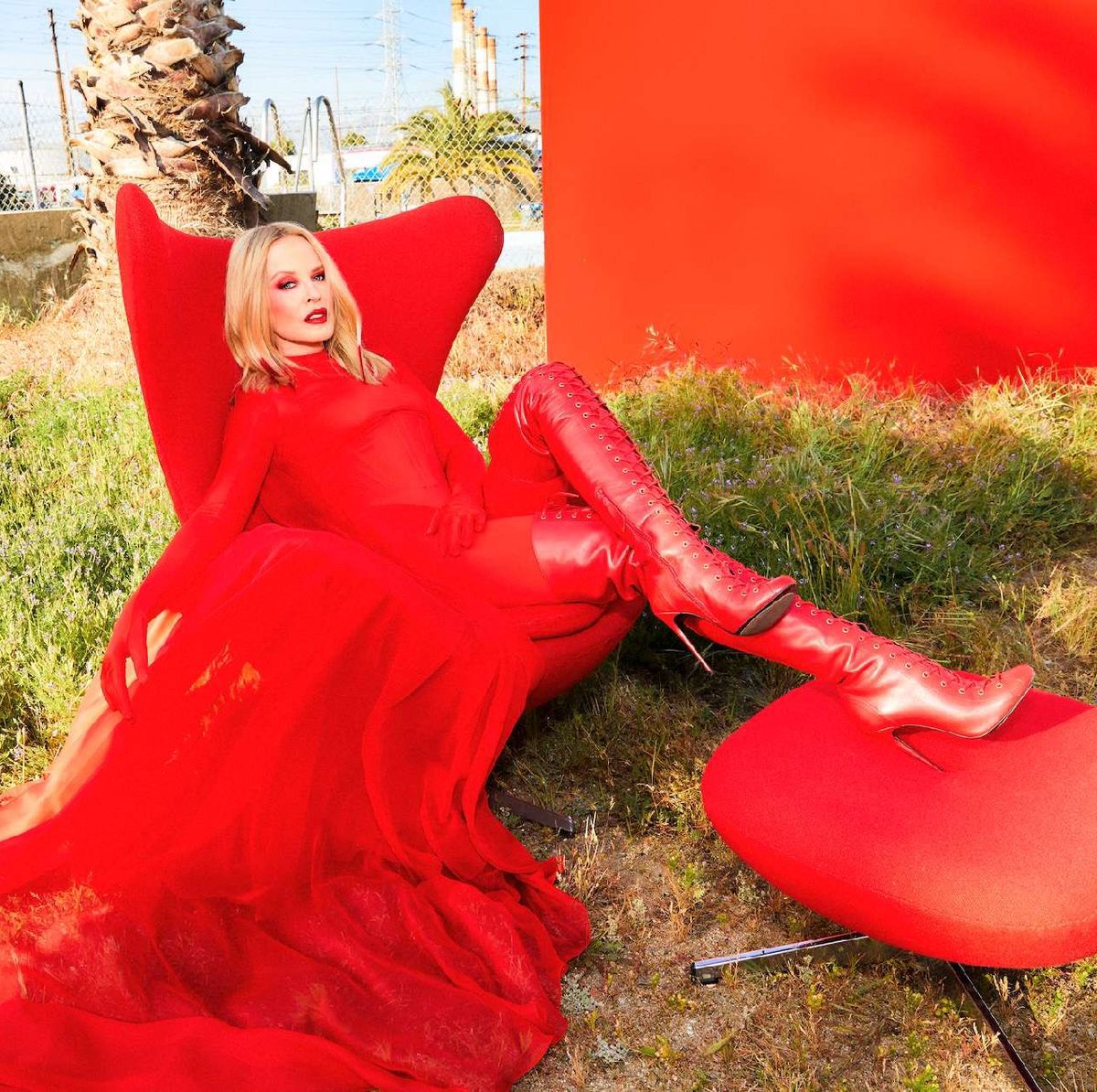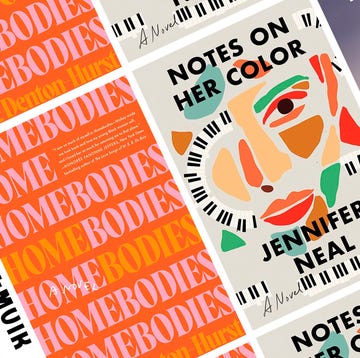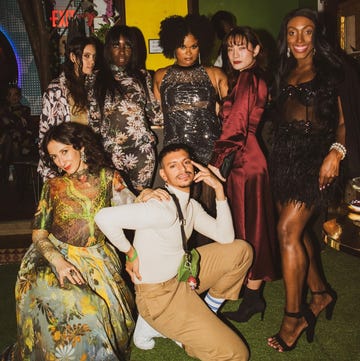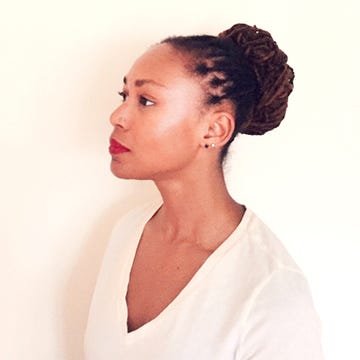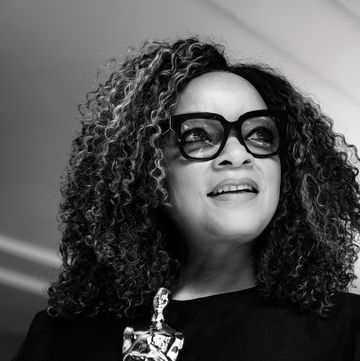I’m currently experiencing one of the gayest weeks of my life, which is saying something. I’m in Italy, where the gay choir I’m part of (strike one) is attending a huge festival of LGBTQ+ choirs (strike two). It’s like Pitch Perfect, but with a lot more homosexuals and, of course, more drama. Oh, and it’s not a competition. Except it totally is. (That’s too many strikes to count.)
At first, our welcome party in Florence had the same awkward vibe as a school dance, with different groups hesitant to mix until enough drinks had been consumed to induce us to introduce ourselves. But one song changed everything: “Padam Padam,” by Kylie Minogue. When its opening bars played over the speakers, the gays heard her siren call and were compelled to storm the dance floor. Soon, everyone was shrieking, and it felt like the trip had truly begun.
“Padam Padam” has become the unexpected anthem of Pride Month 2023. Last week, I found myself at London’s biggest gay club, G-A-Y, in the Soho district. As I watched a group of drag queens perform the song, with scantily clad dancers demonstrating their finest twinkography, giant pink balloons were released from the roof. It was a lot.
More From Harper's BAZAAR

How did this happen? It all started on May 21, when Minogue—the pint-size pop princess who has never been as well known in the U.S. as in her native Australia, the U.K., and Europe—debuted the track on the season finale of American Idol. Social media (Gay Twitter, in particular) went wild for the performance, which featured the singer in thigh-high leather boots alongside a squad of buff male dancers in skintight military-meets-sci-fi outfits. Suddenly, my timeline was full of tweets and memes hyping the song, whose title is inspired by the sound of a heart beating hard when you’re making eyes with someone in the club.
It’s easy to see why “Padam Padam” is Minogue’s biggest hit in years, currently peaking at No. 12 in the U.K. and looking sure to rise further, and charting in Australia, Germany, and the U.S. as well. The song sounds futuristic, but also stands as a classic example of Minogue’s ability to make perfectly timeless pop music. It feels self-referential, but also fresh. And it’s impossible not to notice that queer people, particularly gay men, have been driving its meteoric rise. Not since 2016 and Ariana Grande’s “Into You” have I heard a new song—rather than a time-honored anthem like Cher’s “Believe”—so many times during Pride Month. (Half my Twitter timeline seems to be running an unofficial PR campaign for it.)
But why is “Padam Padam” a gay anthem? Firstly, and most obviously: The song is simply a bop. It’s a heart-pumping, sexy banger that doesn’t take itself too seriously. It reminds me of going out gay-clubbing for the very first time and feeling like the world was my oyster. (Reliving those twink years is surely the ultimate fantasy.) Plus, Minogue has had a huge gay fan base for decades. Alongside her sister Dannii, she headlined Sydney WorldPride in Australia this past February, and in 2019 I watched her headline Pride in Brighton, England, where she wowed an audience of 55,000 with a 20-song set. And despite never having sustainably broken through in the U.S. mainstream (“Can’t Get You Out of My Head” was ubiquitous for a time, but that was over 20 years ago, and her previous hit here was 13 years before that), she maintains an active cult following among American gays.
The popularity of this song runs a little deeper, though. There is a long-held pattern in queer culture, and among gay men in particular, in which we cast ourselves as early adopters of cultural trends, from fashion to music. As self-appointed arbiters of taste, we’re allowed to enjoy even objectively terrible things with a confusing mix of irony and superiority. If something is “so bad it’s good,” we are the ones who get to decide. (Like when we declared that the vapid “Why Did You Do That?”—rather than “Shallow”—was the best song on the 2018 A Star Is Born soundtrack.)
Queer people also have a propensity for using art as part of a coded language that only we—the initiated—understand. A historic example would be San Francisco’s Castro District in the 1970s, during the time of Harvey Milk, when there was an entire sartorial code for gay men, according to which not only different-colored handkerchiefs, but also everyday garments like Converse and plaid shirts all meant different things. (This language was unpacked in Hal Fischer’s seminal work Gay Semiotics.) When I saw Minogue live at Brighton Pride, there was an element of this: a fan-led social media campaign to get her to perform “Your Disco Needs You,” which wasn’t released as a single in the U.K. in 2001 because the label deemed it “too camp” and went on to become a gay favorite. (Faced with a crowd chanting “YOUR DISCO NEEDS YOU!” she eventually obliged.) “Padam Padam” seems to have entered that same gay lexicon, the shorthand many of us use to communicate with each other.
I’m also interested in how the rise of “Padam Padam” has played out on social media. At the most basic level, there is considerable crossover between mainstream gay culture and meme culture. Why? I’m generalizing here (and of course, massively projecting), but becoming completely obsessed with something—a joke, a song, a meme—to the point where it becomes your entire personality for a short period of time is a distinctly gay trait. For example, remember that very weird Pride Month in 2017 when the Babadook became a queer icon? Or more recently, after this February’s BAFTA Awards, I was physically unable to tweet about anything other than the infamous “Angela Bassett did the thing” for several days, thanks to Ariana DeBose’s unintentionally iconic performance. “Padam Padam” has definitely reached personality-trait level for some of us.
Right now, Minogue is soaking up the buzz from her biggest hit in years. It’s an unexpected twist in an already incredible, decades-long career. Soon, the song will probably become so mainstream that straight people like it too, and gay people will declare it “Over!” and move on to something else. Another in-joke to savor for a short while. It reminds me of an astute quote from Sex and the City’s PR maven Samantha Jones: “First come the gays, then the girls—then, the industry.”
